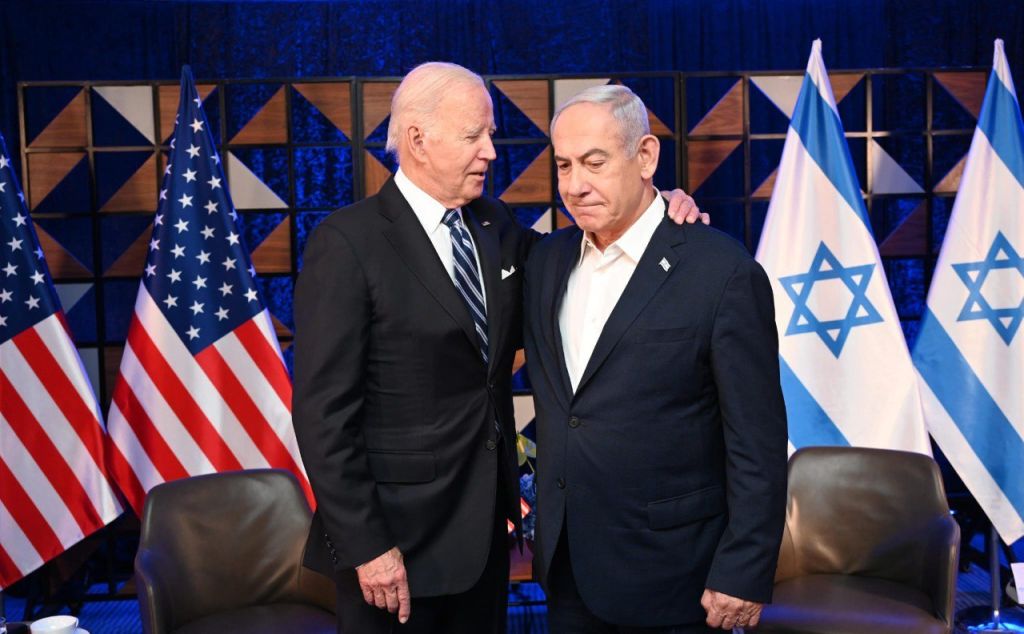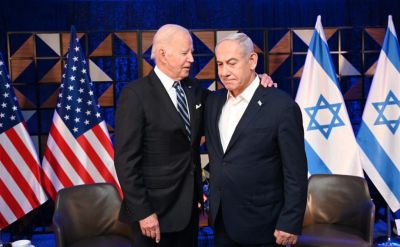President Joe Biden’s commitment to Israel was tested on the eve of his visit to Israel Wednesday. Hours prior to his arrival, a blast shook a hospital in Gaza. Hundreds were initially reported dead.
Hamas officials blamed the explosion on an Israeli airstrike—a narrative quickly reported by major news outlets across the world. Rioting swept the Middle East as demonstrators took to U.S. and Israeli embassies and consulates in Lebanon, Jordan, Turkey, and elsewhere to oppose the alleged Israeli war crime. In his own apparent protest, Jordanian King Abdullah II canceled a four-way summit with Biden and the leaders of Egypt and the Palestinian Authority that had been scheduled for Wednesday.
But the Biden administration wasn’t as quick to assign blame. After landing in Israel as planned, the president publicly confirmed the assessment of Israeli officials and independent researchers: The blast had likely been caused by a stray rocket launched by Islamic Jihad, a Gaza-based terrorist group.
It’s just the latest example of the continuing trend since Hamas terrorists massacred Israelis civilians on October 7: the Biden administration’s continuing, steadfast support for the United States’ longtime regional ally.
“I come to Israel with a single message: You are not alone,” Biden said from Tel Aviv on Wednesday, when he became the first head of state to visit the embattled country since fighting broke out. It echoed the message of Secretary of State Antony Blinken during his own visit to Israel last week.
Biden also announced plans for an “unprecedented” aid package to Israel and promised to keep Israel’s Iron Dome air defense system supplied. His approach hasn’t gone unnoticed in Israel, but the Biden administration hopes the fact that it’s backing up its diplomatic support with military muscle also gets the attention of Israel’s adversaries. “My message to any state or any other hostile actor thinking about attacking Israel remains the same as it was a week ago: Don’t,” Biden said Wednesday.
In addition to sending a rapid response force of 2,000 Marines, the U.S. has deployed two Navy aircraft carriers—the USS Dwight D. Eisenhower and the USS Gerald R. Ford—and their strike groups to the eastern Mediterranean Sea. The bolstered military presence is a “very visible symbol of U.S. support,” said Daniel Byman, a senior fellow at the Center for Strategic and International Studies and a professor at Georgetown University’s School of Foreign Service. “It is a way of sending a message to Iran and others who might want to make this into a regional conflict and trying to deter them. So that’s a less rhetorical form of support and a more pointed one.”
Biden’s trip comes amid continued uncertainty over whether Israel’s neighbor to the north, Iran-backed Hezbollah, will join the conflict. The group’s leader, Hassan Nasrallah, has threatened to attack Israel—and backed that threat up with sporadic missile fire along the northern border—but has thus far shied away from full involvement. Still, the risk of escalation remains high as both sides test the others’ redlines. The destruction wrought by Israel’s campaign against Hamas also threatens to pull in Hezbollah and other Iranian-backed groups. And as civilian casualties mount in Gaza, it may also become more difficult for the U.S. to sustain its current level of public support for Israel.
U.S. officials have reportedly pressed Israel about its plan for Gaza, urging it not to topple its current leadership without a clear plan for the future. In a 60 Minutes interview on Sunday, Biden said it would be a “mistake” for Israeli forces to reoccupy Gaza. Israel, for its part, has denied its interest in doing so. But its stated goal of defeating Hamas could mean a number of things, from taking out the terrorist group’s top fighting echelon to giving the people of Gaza a viable alternative.
“If you’re talking about just taking out the top leadership, and taking out the infrastructure that’s supporting them and allowing them to be the lethal organization they are, that doesn’t have to take long,” Enia Krivine, director of the Foundation for Defense of Democracies’ Israel program, told The Dispatch. “I think that Israel can achieve its short-term goals within a couple of weeks. But the long-term goals of dismantling Hamas and all of its leadership and systems—that will take longer.”
A prolonged war could add to the ranks of the few, mostly leftwing American voices opposing support for Israel. Anti-Israel rallies have already erupted in cities and on college campuses across the country as demonstrators protest the war’s toll on Palestinians.
And the grassroots movements have allies in Congress. In the aftermath of Hamas’ attack, progressive members of the House of Representatives were quick to call for a ceasefire and the cessation of U.S. aid to Israel. The day of the massacre, Rep. Cori Bush demanded an end to “U.S. government support for Israeli occupation and apartheid.” Rep. Rashida Tlaib, likewise, blamed Israel for the attack and called for the “dismantling of the apartheid system that creates the suffocating, dehumanizing conditions that can lead to resistance.”
So far, the Biden administration has had little patience for the anti-Israel sentiment emanating from its own party. “We believe they’re wrong, we believe they’re repugnant, and we believe they’re disgraceful,” White House press secretary Karine Jean-Pierre said last week, asked about the statements from progressive House members. “Our condemnation belongs squarely with terrorists who have brutally murdered, raped, kidnapped hundreds, hundreds of Israelis. There can be no equivocation about that. There are not two sides here. There are not two sides.”
Ironically, the administration’s approach may serve the Palestinians better than those of their self-assigned congressional advocates. U.S. officials are likely to get further in pressing Israelis for humanitarian solutions in Gaza—such as allowing the passage of aid shipments and creating safe zones in the strip—if Israel is convinced of full U.S. support overall. Biden on Wednesday announced a $100 million humanitarian aid package to displaced Palestinians in Gaza and the West Bank, claiming the U.S. had the “mechanisms in place” to make sure it’s not redirected into the hands of terrorists. And Netanyahu pledged to seek to minimize civilian harm during the president’s visit.
“By embracing Israel, Biden may have more leverage,” Byman said. “There’s more trust in Biden that he is committed to the security of Israel, and as a result, when he asks for things, I think it’ll be better received.”
Progressives in the U.S. aren’t alone in their skepticism of Israel. Comments by Republican presidential contenders may put in doubt the GOP’s longstanding support for Israel. Chief among them is former President Donald Trump, who railed against Netanyahu at a recent campaign event. “I’ll never forget that Bibi Netanyahu let us down. That was a very terrible thing,” he said last week, claiming that Israel backed out of the U.S. killing of Iranian Quds Force commander Qassem Suleimani in 2020 (former U.S. officials have since pushed back on Trump’s recollection of the operation). The GOP frontrunner went on to call Hezbollah “very smart.”
Another presidential hopeful, biotech entrepreneur Vivek Ramaswamy, has gone after his fellow candidates for their strong backing of Israel. Speaking to Tucker Carlson on X, Ramaswamy accused Nikki Haley of demonstrating “selective moral outrage” over the Hamas attack. He and Trump are among the growing number of Republicans who have advocated for a smaller U.S. role in global affairs.
“Some elements in the Republican Party are increasingly isolationist. And that troubles Israel, because the longstanding position of Israel is ‘what’s best for Israel is what’s best for America.’ The best thing for Israel is a strong U.S. with a strong economy and a strong foreign policy—and that’s been true for decades,” Krivine said. “So I think that if we do see a sort of Vivek Ramaswamy or more of an isolationist candidate getting into the White House, I do think that that does not bode well for the future of Israel or the world order as we know it.”
But in the immediate term, America’s vocal backing of Israel’s right to self defense may be a boost on the battlefield. “There’s a wall-to-wall feeling right now of American support,” Krivine added. “For Israelis, especially Israelis wearing the uniform, that is a very, very rare experience.”
Click here for more coverage of the war in Israel.







Please note that we at The Dispatch hold ourselves, our work, and our commenters to a higher standard than other places on the internet. We welcome comments that foster genuine debate or discussion—including comments critical of us or our work—but responses that include ad hominem attacks on fellow Dispatch members or are intended to stoke fear and anger may be moderated.
With your membership, you only have the ability to comment on The Morning Dispatch articles. Consider upgrading to join the conversation everywhere.